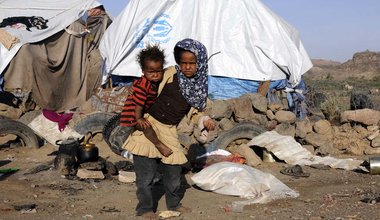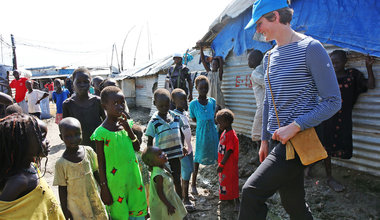Mosul offensive against ISIL pushing Iraq’s civilians into war-ravaged Syria – UN rights wing
 Amid the intensification of the military offensive against the Islamic State of Iraq and the Levant (ISIL/Da’esh) in Iraq’s Mosul city and the resulting displacement of civilians, the United Nations human rights wing said today that it has received reports that Iraqi civilians are also fleeing into Syria, which itself is reeling under a five-year long conflict that has displaced millions of Syrians and left hundreds of thousands trapped in besieged cities.
Amid the intensification of the military offensive against the Islamic State of Iraq and the Levant (ISIL/Da’esh) in Iraq’s Mosul city and the resulting displacement of civilians, the United Nations human rights wing said today that it has received reports that Iraqi civilians are also fleeing into Syria, which itself is reeling under a five-year long conflict that has displaced millions of Syrians and left hundreds of thousands trapped in besieged cities.
“We have received reports that Iraqi civilians from rural areas around Mosul city have been arriving in Syrian governorates of Raqqa, Deir ez-Zour and al-Hassakeh,” Ravina Shamdasani, a spokesperson for the Office of the UN High Commissioner for Human Rights (OHCHR), told journalists at the UN Office at Geneva earlier today.
“They reportedly left, after the Iraqi Security Forces and allied armed groups captured the areas, fearing they would be seen as affiliated to ISIL,” she added.
OHCHR further said it also received reports that several hundred Iraqi civilians are in a “dire humanitarian situation” in Rajm al-Sleibi in the Syrian governorate of al-Hassakeh (on the border with Iraq), which is under the control of People’s Protection Units (or YPG), an armed group in northern-eastern Syria.
These people include those who have fled the current Mosul fighting and those who had earlier crossed into Syria from Iraq.
Reports have also been received that in the ISIL-controlled Syrian governorate of Raqqa, newly arrived families have been housed at the entrance to Raqqa city, in the neighbourhood of al-Mashlab, which is under the strong control of ISIL.
“We are concerned that [such] ISIL tactics […] endanger the civilian population […] – namely taking civilians hostage and planting improvised explosive devices in civilian houses and residential neighbourhoods,” said Ms. Shamdasani noting possible ground operations by Kurdish and other forces as well as airstrikes by the US-led Coalition.
No respite for civilians in Syria
Meanwhile, the humanitarian situation in Syria continues to deteriorate and according to reports, civilians – including women and children – continue to become casualties in air and ground-based strikes as well as lose their lives in want of medical treatment, said the UN human rights arm.
On 9 November, 23 civilians, including six women and at least four children, were killed and at least 30 others were injured in an airstrike and accompanying ground-based strikes on al-Hisha, an ISIL-controlled village in northern ar-Raqqa. Furthermore, a mortar hit a civilian vehicle, killing two passengers who were trying to transport injured civilians.
Also on 9 November, a young woman and an elderly man – both suffering from kidney disease –reportedly died due to lack of medical treatment, reported the OHCHR spokesperson.
“We remind the parties that they must allow and facilitate the rapid and unimpeded passage of humanitarian relief for civilians in need,” said Ms. Shamdasani, stressing: “The imposition of restrictions or conditions by the parties preventing the sick and wounded from being evacuated from the area is strictly prohibited under international humanitarian law.”
Displacement in Mosul nearly doubled last week – UN refugee agency
Focusing the Mosul offensive, the Office of the UN High Commissioner for Refugees (UNHCR), also said today that nearly 48,000 Iraqis have been displaced since the beginning of the offensive last month but this number has seen a recent spike.
“Numbers have approximately doubled in the last week and are expected to continue to rise as the fighting continues. Several significant population movements from Mosul were recorded in the last week, especially around Gogjali and the city’s eastern neighbourhoods,” William Spindler, a UNHCR spokesperson told the same media briefing.
In response to this influx, the UN refugee agency along with humanitarian partners are providing life-saving protection to ensure that the new arrivals have adequate shelter, and basic household items such as mattresses, stoves, kitchen sets, hygiene sets and jerrycans.
The UNHCR spokesperson further said that the agency is also increasing its protection monitoring and psychosocial and legal assistance to the internally displaced persons through mobile teams to ensure timely interventions when concerns are identified.
“People with specific needs or vulnerabilities are being identified quickly to ensure they receive specialized support,” he underlined.
UNHCR already has six camps open, with a capacity to host 54,408 people and it is planning to have a total of 11 camps, should land be made available, with a capacity to accommodate 120,000 people.
The agency is also identifying further land for emergency sites. This is part of a broader response with the government of Iraq and other humanitarian partners who are also reinforcing camp capacity and preparing for other shelter options to support a total of 700,000 internally displaced Iraqis if needed.
Winter will be challenging
However, as the weather has started to turn and as temperatures have begun to drop sharply at night, the agency and its partners have begun distributing essential winter items to 1.2 million recently-displaced Iraqis including families who have fled the Mosul offensive.
In the midst of this situation, UNHCR stressed that residents of Mosul seeking sanctuary must not be prevented from fleeing and that they should have access to safe areas including the emergency camps.
“Likewise, civilians must not be forced to return to unsafe areas,” said Mr. Spindler.
He further drew attention to the fact that the agency’s Mosul Emergency Response Appeal, amounting to $196.2 million, is only 57 per cent funded.
“Underfunding will severely limit the agency's capacity to respond to the needs of the most vulnerable families during winter – particularly for heating,” underlined the UNHCR official.
 UN
UN








